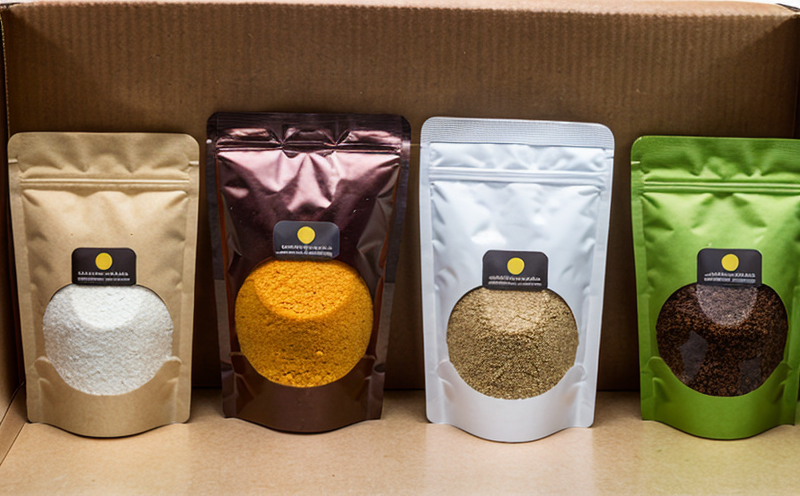NOGE Migration Testing in Packaging Materials
No-Extractable and Extractable Gases (NOGE) migration testing is essential when assessing packaging materials used in contact with foodstuffs. This critical process ensures that the gases present within the packaging material do not migrate into the food, thereby safeguarding product quality and consumer health.
The no-extractable gases are those that cannot be removed from the packaging through normal processing or use conditions. Extractable gases, conversely, can be transferred to the food during storage or consumption. Both types of gases need careful monitoring because their migration into food can lead to a change in flavor, texture, and even safety issues.
For instance, in flexible packaging made from polyethylene (PE), it is important to test for both no-extractable and extractable gases. The test involves placing the material under standardized conditions that simulate real-world storage scenarios. After a specified period, the gas composition inside the package is analyzed to ensure compliance with regulatory standards.
The testing process typically includes several steps: specimen preparation, exposure to controlled environmental conditions such as temperature and humidity, and subsequent analysis of released gases. Specimens are often cut into specific sizes that reflect typical packaging dimensions for a given product type.
Accurate gas migration testing is crucial for manufacturers aiming to comply with international standards like ISO 17395:2020 or ASTM D4869-21. These guidelines provide detailed protocols on how to perform the tests rigorously, ensuring reliable results that can be used for regulatory submissions.
Understanding the migration behavior of gases is vital because it impacts not only product safety but also shelf life and packaging efficiency. For example, if a gas migrates from the packaging into the food, it could alter the sensory attributes of the product or even pose health risks depending on the nature of the gas.
Testing laboratories play an integral role in ensuring that these tests are conducted accurately and consistently across different materials. By leveraging advanced analytical techniques such as gas chromatography-mass spectrometry (GC-MS), labs can identify minute quantities of gases present within packaging, providing precise data for interpretation.
The importance of NOGE migration testing cannot be overstated in today’s highly regulated food industry landscape. Regulatory bodies worldwide are increasingly focusing on ensuring that all components used in direct contact with food meet stringent safety requirements. This includes not only the materials themselves but also their interaction during storage and use.
Why It Matters
No-Extractable and Extractable Gases (NOGE) migration testing is imperative for ensuring that packaging materials do not introduce harmful substances into food products. The primary concern is the potential for gases to leach from the packaging into the food, which can lead to changes in taste, texture, or even safety issues.
Consumer health and product integrity are paramount considerations in this testing. Regulatory authorities such as FDA (Food and Drug Administration) and EFSA (European Food Safety Authority) set strict guidelines regarding what is permissible in direct contact with food. Compliance with these regulations helps protect consumers from potential risks associated with ingesting non-food substances.
From a business perspective, ensuring compliance through rigorous testing also enhances brand reputation by demonstrating commitment to quality and safety standards. Non-compliance can result in recalls, legal actions, and significant financial losses for companies involved in the food industry.
The environmental impact of packaging should also be considered during this process. Sustainable practices are encouraged, including the selection of materials that minimize adverse effects on both human health and ecological balance. Testing labs like Eurolab assist clients in making informed decisions about material choices by providing comprehensive data on migration behaviors under various conditions.
In summary, NOGE migration testing is essential for maintaining high standards of food safety, preserving product quality, enhancing consumer confidence, and fostering responsible environmental practices within the packaging sector.
Benefits
- Ensures Compliance with Regulatory Standards: By conducting thorough NOGE migration tests, manufacturers ensure their products meet strict regulatory requirements set by bodies such as FDA and EFSA.
- Maintains Product Quality: This testing helps prevent any changes in the taste or texture of food products due to gas migration from packaging materials.
- Promotes Consumer Confidence: Compliance with regulations fosters trust among consumers regarding the safety and quality of packaged foods.
- Aids Sustainable Practices: Testing supports the selection of environmentally friendly materials that do not compromise on health or performance.
Eurolab Advantages
At Eurolab, we pride ourselves on offering comprehensive and accurate NOGE migration testing services tailored to the specific needs of our clients. Our state-of-the-art facilities equipped with cutting-edge technology ensure precise results that are reliable and repeatable.
We employ a team of highly qualified experts who possess extensive experience in food contact materials evaluation, providing expert insights throughout your project lifecycle. From initial consultation to final report delivery, we strive to make the process as seamless and efficient as possible for our clients.
Our commitment to excellence extends beyond just meeting current standards; Eurolab stays abreast of emerging trends and regulations in this field, ensuring that our services remain relevant and effective. We offer flexible turnaround times based on your project requirements while maintaining the highest levels of accuracy and integrity.
In addition to technical expertise, we also provide extensive support services including consultation on material selection, formulation advice, and assistance with regulatory submissions. This holistic approach allows us to be more than just a testing partner – we are committed to being an integral part of your product development journey.





